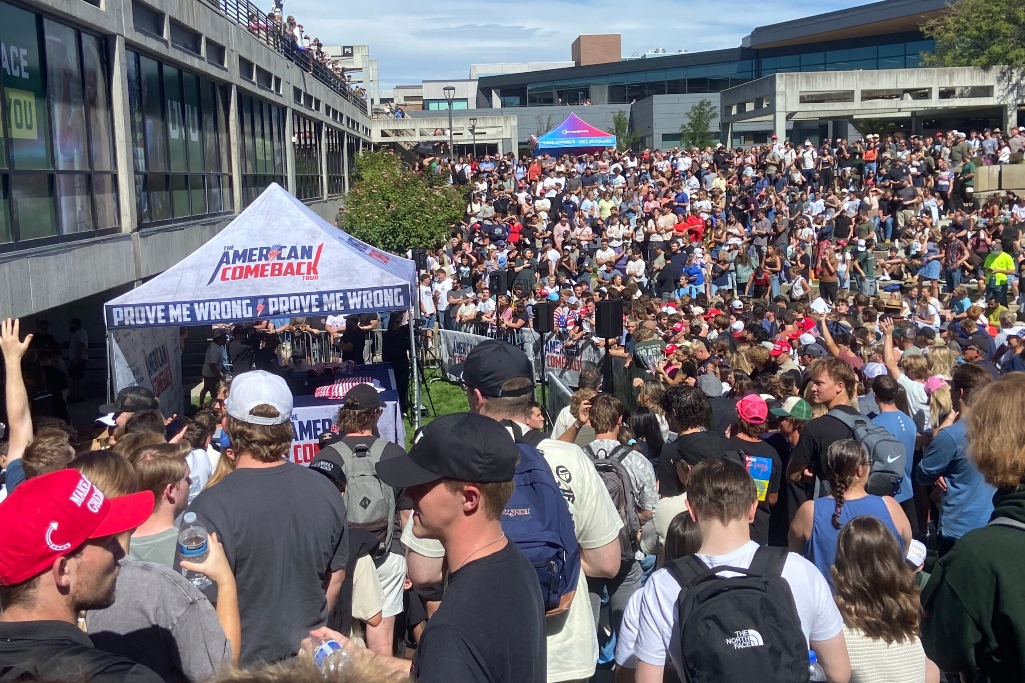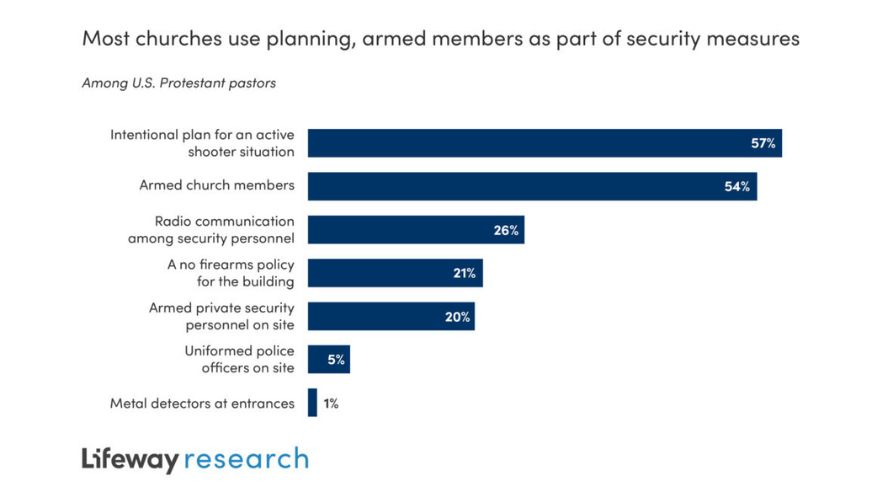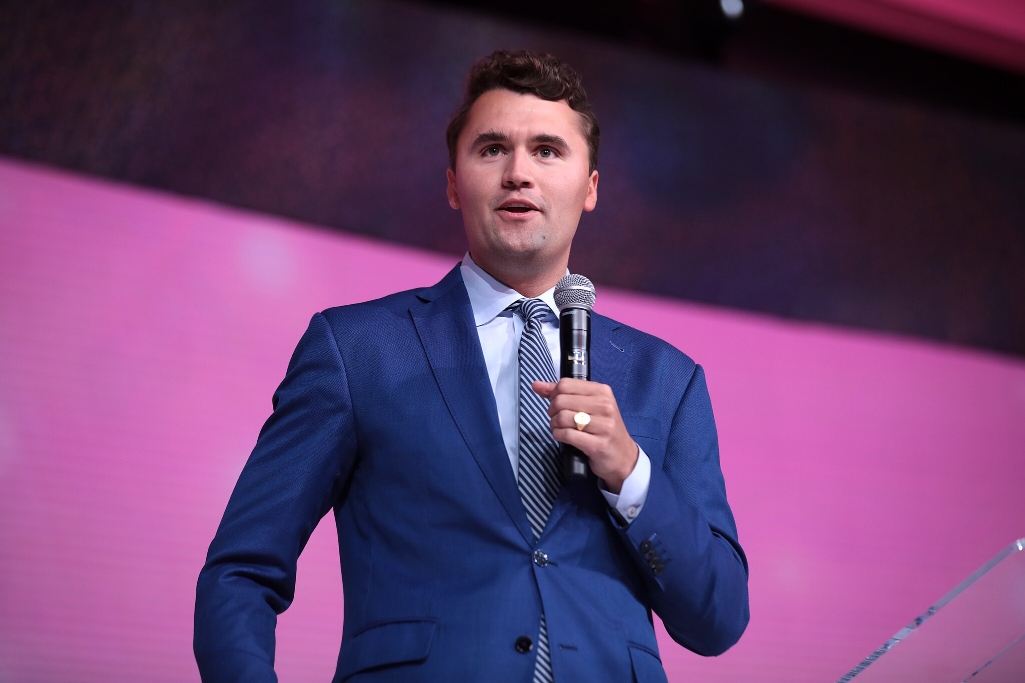
Scott Harding took this photo moments before the start of Charlie Kirk's kickoff to The American Comeback tour at Utah Valley University.
OREM, Utah (BP) — Celebratory poppers. That’s what Scott Harding thought he heard before seeing Charlie Kirk, seated about 25 feet away, go down to the floor.
Harding had become a fan of Kirk’s method for engaging others through his Christian faith, using dialogue and debate as a way to bring about change. It’s why he had arrived with thousands of others at the campus of Utah Valley University (UVU) Wednesday (Sept. 10), the first stop of Kirk’s “The American Comeback” tour.
Kirk’s Prove Me Wrong table had become a central point of his visits to college campuses. His points were encouraging to people like Harding, who had grown familiar with Kirk primarily through videos shared on Facebook.
“I have great respect for his courage and unashamed witness and testimony as a Christian,” said Harding, a member of Risen Life Church in Salt Lake City. “He was unapologetic and would share his testimony with love. He would take that first step in debates of defining his Christianity, so I wanted to be there as a fellow believer to support him.”
Harding has a niece who had planned on being at the event but had to cancel, so he was there alone. He said Kirk had just finished up a discussion with a man belonging to the Latter Day Saints (LDS) church, encouraging him to ask questions while stating he loved LDS people. The next question concerned the number of mass shootings, with Kirk asking a clarifying question, when Harding and others heard the “pop.”
“The moment felt … clunky,” Harding told Baptist Press. “Your mind fires a million times a second, at least mine did. I saw Charlie go down. So I went down. Then I realize it’s a gunshot. Then somebody yelled, ‘Run!’ Then everyone ran.”
Buildings surround the courtyard where the event took place, so Harding went to a hallway and waited.
“My mind is still firing and I’m processing stuff,” he said. “I hadn’t heard a second shot, so I’m thinking they’ve either taken out the shooter or the guy is reloading or I don’t know. As I’m going through this corridor, I don’t know if the shooter is running through in this direction, so I’m trying to process all of that and be aware of people and see if there’s something that looks like a threat, but my thinking is to try and get someplace safe.”
Harding made his way outside and up a hill, eventually positioning himself next to a maintenance building. In his mind, he mapped out different escape routes should he encounter the gunman.
His point of view had been to Kirk’s right, so Harding had not seen the neck wound and wasn’t even aware whether Kirk had been hit.
“Everyone was stunned when it happened,” he said. “Then it was chaos and panic.”
Driving up earlier, Harding had been struck by the lack of security. He parked in a side lot and walked unimpeded into the area behind the stage. Several booths promoting UVU student groups had been set up to take advantage of the expected crowd. He didn’t go through a security checkpoint and saw only two uniformed officers in the parking lot.
“Before the event began, I remember thinking that I didn’t see any uniformed officers inside,” he said. “I wondered what the protocol was. It was all very concerning to me.”
That continued to run through his mind as Harding stood by the maintenance building, his head on a swivel as different scenarios raced through his mind.
“I thought that if the shooter is still active, the only cops I’d seen were the two in the parking lot. I felt safe on the hill, but it was nearly 10 minutes before an ambulance showed up. Supporting officers didn’t arrive until six or seven minutes after (the shooting). We know now that an ambulance wouldn’t have saved Charlie, but my thought was that there was no preparation from a safety standpoint by the university.
“It’s a weird feeling to go to an event you think is safe and peaceful and then realize you weren’t safe.”
Over the next 30-45 minutes, Harding watched numerous law enforcement officers arrive alongside SWAT and the FBI. Two snipers walked by him with long-range guns and silencers.
Harding texted his family to let them know he was OK, but there had been a shooting. He had to talk his way back into the parking lot, as it had become a staging area for law enforcement and emergency response vehicles. He finally left about 1 hour and 45 minutes after arriving.
Harding got home and sat down, processing things. His sister called to see if he was OK. He said he was. She said he had been through something traumatic. He felt he hadn’t. She told him he would probably feel it later.
“I sat there and collected my thoughts,” he said. “Then I learned Charlie had passed, and I felt a really heavy weight, like we had lost a beacon of light for Jesus in the world.”
A drive in his truck with his dogs felt right. His Golden Retriever, Gus, and Chloe, a Pomeranian, happily joined him for a 45-minute ride.
After Harding got home, a nephew reached out, wanting to come by and check on him. Harding considered declining, then thought better of it and said sure. He and others in the family had been praying for his nephew for some time.
He came over for a coffee. Come to find out, his nephew had been a fan of Kirk’s and a daily listener of his podcast. Harding handed him some stickers from Kirk’s event.
“I’m going to save these for the rest of my life,” his nephew said.
The rest of the evening, before bed, was spent thinking and watching the news. The shooter wasn’t caught yet, but Harding’s thoughts remained on Kirk and his family.
“He was a big spotlight. But it got me thinking that if enough of us become smaller lights and do our own little part, we can become just as big a light. Charlie was unique in what he did. He saw the value in every human and loved them even if he didn’t love the things that person did.
“I remember an interview I saw of him two months ago. He was asked that if he died, what would he want to be known for? He said he would want to be known for courageously sharing his faith and being saved by Jesus.”
(EDITOR’S NOTE — Scott Barkley is chief national correspondent for Baptist Press.)


